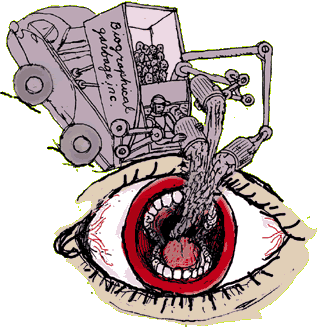
The People, it seems, have an insatiable appetite for biographies. Every TV channel from ABC to A&E has been cranking out lives like sausage. Minor movie stars, gangsters, serial killers, politicians, and moguls are all grist for the mill. This made-for-TV pablum has the advantage of being cheap to produce and easy to consume. Sausage, flour, and pablum is about as healthy a diet as cheeseburgers, another favorite food of the American people. But is it easy to digest?
We may not feel it right away, but this diet is deadly. The subjects have been reduced to their dramatic essentials. All of them are tragic. None of them are ordinary. They all have sappy endings.
Al Capone, Joan Crawford, Howard Hughes, Ted Bundy, and Teddy Roosevelt share exactly the same structure, no matter what the details. They beat the odds, they rise, they have their hearts broken, they fall, they speak in bad prose, they are narrated in even worse prose. Your average citizen may have done nothing more spectacular for half a century than go to work and turn on the TV, but he can't help but identify with the basic structure underlying all lives told in such a manner. Bad prose is more contagious than measles. We are in an epidemic now.
On the other hand, your average viewer can also feel superior. Sure, these people got famous, but look where fame got them: pills, booze, liver transplants, broken marriages. It is so reassuring, especially in bad prose. We too could have taken the path to glory, scandal, and a bad end, but we were smarter than that. We listened to mom and dad, we were good, and we avoided the pitfalls of an outrageous life. Pass the potato chips.
Is there envy? Sure, but no more than is necessary. The sinking feeling that one might have had a glamorous life is easily palliated by the morality lesson in the inevitably disastrous consequences. Ah, if only we could have had all the fun without all the pain! But wait, we still can. And so your viewer turns regret into fantasy. In this fantasy, one is toasted and loved, applauded and rewarded. One might even be cruelly disappointed, dispossessed, and forgotten, but it's all in the delicious space of an hour and all in bad prose.
Most of these TV biographies are not, in fact, about real people. Entertainment figures, in particular, are not real people. From the moment an actor or a singer enters the public arena he is transformed into the subject of a biography, whether he knows it or not.
Agents, handlers, producers, directors, and even teachers work to transform the human being in their power into a showbiz cliché. By the time these poor wretches' lives get retold on A&E, they have already been turned out. It's no big leap for a skinflint producer of cheesy docs to pour an already shaped "star" into the mould. There are loads of such "stars" in the dry storehouse of pop culture history, just waiting to be pulled out and hydrated.
Criminals and war heroes are crammed into the same biography formulas, even if their lives evinced more qualities of will and self-making. In their cases, the televised bio is even farther from truth than that of their more malleable entertainment counterparts. They are victims of a double cliché, one of structural simplification and one of moral conceit. And they get to speak really wooden English.
It's no wonder that most subjects want nothing to do with the producers of these shows. You can tell which celebs are genuine and which are not: those who collaborate in these simulacra are phonies. Those who don't, understand the horror. And that's the only real thing. Understanding the horror. In the end, everyone will. When they run out of celebs, they'll turn to you, mon viewer. Before you're through with that potato chip, your life will be on TV. Get ready to speak the way you think.
Andrei Codrescu was born in Transylvania and lives in New Orleans. His latest books are Messi@h, a novel (Simon and Schuster) and Ay, Cuba!: A Socio-Erotic Journey (St. Martin's Press).
